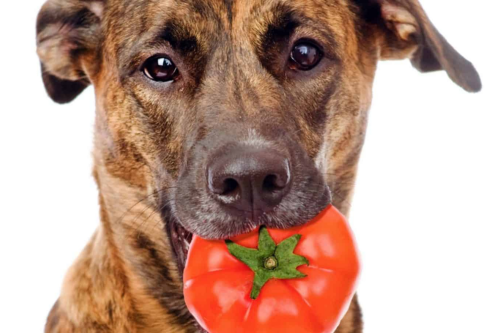
What are the health benefits of tomatoes for dogs? Here is what you need to know about
The health of our furry friends is always one of the top priorities when it comes to caring for them. There are times when we find ourselves asking ourselves if certain human foods are suitable for our dogs when we are pet owners. The humble tomato is one of the foods that raises questions when it comes to its nutritional value. Do dogs have the ability to eat tomatoes? Does it pose a risk to their health if they consume these products, or are they good for them?
Our purpose in this article is to take a closer look at the potential health benefits and risks associated with feeding tomatoes to dogs. Additionally, we will provide information about how you can incorporate them into your dog’s diet in a safe and healthy way, as well as what you should do if you think your dog has consumed an unsafe amount of them. In this article, we will explore the topic from a pet health perspective, offering expert tips, insights, and everything you need to know to make informed decisions regarding your dog’s health.
Expert Takeaways
- Tomatoes can be safe for dogs in small, controlled amounts. The fruit itself, when ripe, is non-toxic, but parts of the plant (stems, leaves, unripe tomatoes) contain solanine, which can cause toxicity.
- Health benefits include essential vitamins, antioxidants like lycopene, and hydration. However, they should only be an occasional snack.
- Avoid tomato-based products like sauces and ketchup that contain added salt, garlic, or sugar.
- Moderation is key. Excessive consumption of tomatoes, even ripe ones, can cause digestive upset, including stomach pain and diarrhea.
Are Tomatoes Safe for Dogs to Eat?
Tomatoes are a popular fruit in many households, enjoyed in salads, sauces, and snacks. But when it comes to dogs, the short answer is: Yes, dogs can eat tomatoes in moderation—but with certain important caveats. Tomatoes belong to the nightshade family (Solanaceae), which includes plants like potatoes, peppers, and eggplants. While many of these plants are safe for dogs in small amounts, some parts of the tomato plant can be toxic to them.
The ripe fruit itself is generally safe for dogs to consume. However, unripe tomatoes (green tomatoes) and certain parts of the plant, such as the stems and leaves, contain solanine, a toxic compound that can cause serious health problems in dogs.
The Benefits of Tomatoes for Dogs
If fed properly and in moderation, tomatoes can provide some health benefits for dogs. Here are a few reasons why tomatoes may be a good occasional treat for your dog:
- Rich in Nutrients: Tomatoes are a good source of vitamins and minerals. They contain vitamin C, which supports immune function, and beta-carotene, which is a form of vitamin A that can help with eye health and vision.
- Antioxidant Properties: Tomatoes are rich in antioxidants, particularly lycopene, which is known for its antiinflammatory properties. This can help fight oxidative stress and support overall cellular health in dogs.
- Low in calories: Tomatoes are low in calories and fat, making them a healthy snack for dogs who need to maintain a healthy weight.
- Hydration: Tomatoes are about 95% water, making them a good option for keeping your dog hydrated, especially during hot weather.
The Risks of Feeding Tomatoes to Dogs
Despite their potential benefits, there are some risks associated with feeding tomatoes to dogs. As mentioned earlier, the most dangerous parts of the tomato plant are the green, unripe tomatoes, as well as the stems and leaves. These parts of the plant contain solanine, which can cause toxicity in dogs.
Symptoms of solanine poisoning in dogs include:
- Vomiting
- Diarrhea
- Drooling
- Lethargy
- Loss of appetite
- Abdominal pain or discomfort
- Heart problems in severe cases
These symptoms usually show up within a few hours of ingestion. If your dog shows any of these signs after consuming a tomato or part of the tomato plant, it’s important to seek veterinary attention immediately.
Another risk to be aware of is that excessive tomato consumption could lead to digestive upset, including stomach irritation and diarrhea. This is why moderation is key when feeding tomatoes to your dog.
How to Safely Feed Tomatoes to Your Dog
To safely introduce tomatoes into your dog’s diet, follow these guidelines:
- Remove the Stem and Leaves: Always remove the stems, leaves, and any unripe parts of the tomato before offering it to your dog. These parts can contain solanine, which can be harmful.
- Serve Ripe Tomatoes Only: Only feed your dog ripe tomatoes that are fully red. Ripe tomatoes contain lower levels of solanine, making them safer for your dog.
- Feed in Moderation: While tomatoes are safe in small amounts, you should never feed them to your dog in large quantities. A few small pieces of ripe tomato, once or twice a week, is plenty for most dogs.
- Avoid Tomato-Based Products: Tomato-based products like ketchup, sauces, or soups often contain added ingredients like salt, garlic, and onions, which can be harmful to dogs. Stick to fresh, plain tomatoes.
- Watch for Allergies: As with any new food, introduce tomatoes to your dog’s diet slowly. Watch for any signs of food allergies or sensitivities, such as itching, swelling, or gastrointestinal distress.
Common Questions About Dogs and Tomatoes
Q: Can puppies eat tomatoes?
Puppies can eat tomatoes, but they should only be given small amounts of ripe, fresh tomatoes. As puppies are still developing, their digestive systems are more sensitive, so it’s important to introduce tomatoes gradually. Always make sure the tomato is fully ripe and free of stems or leaves.
Q: Can tomatoes cause kidney problems in dogs?
A: There is no direct evidence to suggest that tomatoes, in small amounts, cause kidney problems in dogs. However, excessive consumption of any food can stress the kidneys, especially in dogs with pre-existing health conditions. If your dog has kidney disease or any other underlying health issues, consult with your veterinarian before introducing new foods to their diet.
Q: What should I do if my dog eats a large amount of tomatoes?
A: If your dog consumes a large amount of unripe tomatoes or any part of the tomato plant, it’s crucial to contact a veterinarian immediately. Solanine toxicity can be serious, and prompt medical attention is required. Even if you’re unsure whether your dog has eaten a toxic amount, it’s better to be cautious and seek veterinary advice.
Q: Are cherry tomatoes safe for dogs?
A: Yes, cherry tomatoes are safe for dogs in small amounts, as long as they are ripe and free from the stems and leaves. However, due to their small size, cherry tomatoes can be a choking hazard if fed whole. Always cut them into smaller pieces to avoid this risk.
Q: Can tomatoes help with my dog’s digestion?
A: Tomatoes contain fiber, which can aid in digestion and help with regular bowel movements. However, they should not be used as a primary source of fiber. If your dog has digestive issues, it’s best to consult with your veterinarian about appropriate dietary changes.
Expert Tips on Feeding Tomatoes to Dogs
- Consult Your Veterinarian: Always check with your veterinarian before introducing any new foods into your dog’s diet. They can provide specific guidance based on your dog’s age, breed, health condition, and dietary needs.
- Start Small: When offering tomatoes to your dog for the first time, start with just a small piece. Monitor how your dog reacts and watch for any signs of digestive upset or allergic reaction.
- Choose Organic Tomatoes: If possible, opt for organic tomatoes to minimize the risk of pesticides or chemicals that could harm your dog.
- Avoid Salt and Seasoning: Many human foods contain salt, garlic, or other seasonings that are harmful to dogs. Stick to plain, unseasoned tomatoes for the healthiest treat.
Pros and Cons of Feeding Tomatoes to Dogs
| Pros | Cons |
|---|---|
| High in vitamins and antioxidants | Parts of the plant are toxic |
| Low in calories and fat | Can cause digestive upset if overfed |
| Helps with hydration | May cause allergic reactions in some dogs |
| Rich in lycopene (anti-inflammatory) | Choking hazard if fed in large chunks |
Conclusion
In summary, tomatoes can be a healthy and enjoyable treat for your dog when given in moderation and with caution. Always ensure the tomatoes are fully ripe, remove any dangerous parts of the plant, and watch for any adverse reactions. If you’re ever in doubt, reach out to your veterinarian for personalized advice.
By following these guidelines, you can safely introduce this delicious fruit into your dog’s diet as a fun, occasional snack. Just remember—like all treats, tomatoes should never replace your dog’s balanced, complete diet and should always be fed in moderation.
For further information, feel free to explore trusted pet care and wellness resources, such as American Kennel Club or PetMD, which provide detailed insights into pet health, safety, and nutrition.


Leave a Reply
You must be logged in to post a comment.